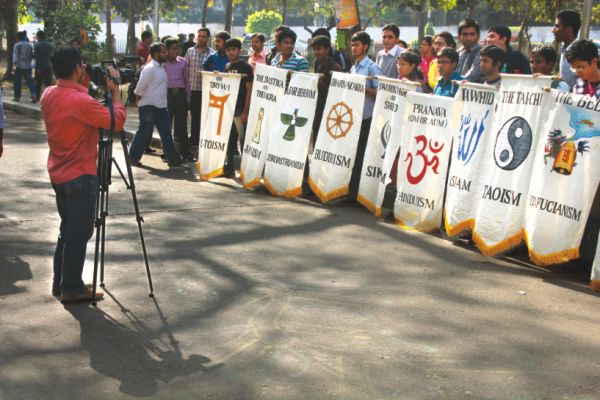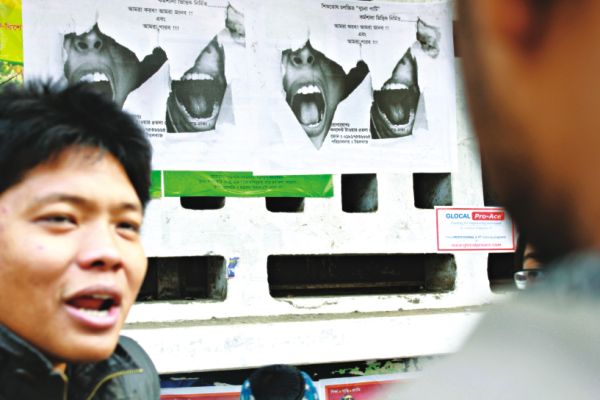| Spotlight

I think. I resist. I feel - I am free.
Saad Adnan Khan
Photos:Kazi Tahsin Agaz Apurbo
Models: Sami Mahbub, Tanzeeb Zaman
Everyone has the right to freedom of opinion and expression- Article 19, Universal Declaration of Human Rights.
* Constitution of the People's Republic of Bangladesh ensured freedom of speech and expression. Article 39: (1) Freedom of thought and conscience is guaranteed. (2) Subject to any reasonable restrictions imposed by law in the interests of the security of the State, friendly relations with foreign states, public order, decency or morality, or in relation to contempt of court, defamation or incitement to an offense-
a) The right of every citizen of freedom of speech and expression; and freedom of the press are guaranteed. (Web)
* Freedom House is an international NGO, which monitors and advocates for democracy worldwide. It publishes an annual report that assesses the degree of democratic freedom in each country. It rated Bangladesh as partially democratic in 2011.
We like to believe that we are rebels; that we bring changes. Perhaps we do- among our circles of friend, in class rooms, at home. We are interested in the politics of inspiring and enlightening through speaking, writing, singing, dancing and expressing ourselves in so many other ways. It is important and urgent that we do so, because solutions, ideas and imaginations cannot come from one single person. It is through our ways and contributions that we become free. Our capacities, our thoughts, our opinions make us agents, and not subjects of dominant ideologies that exist in society. However, there are few questions that stay at the back of everyone's mind: to what degree are we actually free? To what extent can we practice our freedom?
 |
To what degree are we actually free? Are classrooms and homes safe enough places where we can express ourselves? |
Are classrooms and homes safe and liberal enough places where we can speak our minds? Will we get an audience when we want to share our thoughts and ways of developing the nation? Can we enlighten others to break free from religious, nationalist and political ideologies to become free individuals, to think independently? Aren't our social networks statuses monitored 24/7, in case we express a different opinion or in “their” words, say something that is anti-Islam, anti-national, anti-ruling political party, or in short, anti-power?
“For me freedom of speech means the right to say 'no' when I want to, and to stand out with my disagreements with certain practices when it is needed even if it goes against the interests of our outrageously corrupt politicians.”- Ali Ahmed, University of Dhaka.
According to the constitution, we are supposed to have democracy, but that is too idealistic of a notion in the reality of any democratic country. True democracy is a utopian thought. Citizens of every democratic country have to face dire consequences due to political corruption. But it is a notch higher in this country, where lives are at stake if thr truth is spoken, thus, breaching the very law of freedom of speech. Only 2 years back, access to Facebook was blocked for a week over satirical pictures of political leaders and the person, who put up the pictures, was jailed. The recent black out of TV channels Bangla Vision, Ekushe TV and Islamic TV by Awami League during the BNP rally exemplifies how free press is not really free either. However, Bangladesh has scrapped a provision of “direct arrest warrant” against journalists for writing or saying anything defamatory. The national parliament of Bangladesh on February 2, 2011 passed a bill eliminating the arrest warrant provision under its Criminal Procedure Code (CrPC), which is a break through. But these are big talks that we mesmerize ourselves with. Once we ground ourselves among the commoners, once we step inside classrooms of our schools and universities, do we see the implementation of freedom of speech? Freedom of speech is no big talk. It is the matter of one's rudimentary right.

Our capacities, thoughts, opinions make us individuals, and not subjects of dominant ideologies in society.
“Freedom of speech is freedom from censorship, voices being understood, not just heard.”- Ferzeen Anis, University of Melbourne, Australia.
Often times it is seen that teachers in schools are not interested to hear about what the students think. Teachers do not push students to challenge science, society, religion and culture. Instead teachers rely on the obsolete technique of spoon feeding, which makes everyone's lives less complicated. Students no longer think beyond. And if someone does, if someone brings in a different imagination, what is the guarantee that that student will not be judged or dismissed? “It's funny and ridiculous how teachers often simplify things. Students are taught about the British colonial history without any form of criticism, about how homosexuality is “bad” in Islamic teaching classes and about how women are supposed to be child-bearers in biology classes. If I had said anything against all that when I was at school, how do you think my teachers and friends would have reacted?” says Jessica Lia, Alumna of Gopalganj High School.
“To be able to express opinion without punishment, fear for my life or any kind of reprisal.”- Sumbal Momen, Smith College Alumna.
If students do not learn to express their thoughts without feeling shame, there are slim chances of them becoming critical and independent thinkers. “I believe that for education to be effective, and to teach the important skills for creative and critical thinking teaching has to be interactive. This means we have to create classrooms where students are encouraged to learn independently (without needing guidance from the teacher), ask questions and think critically about what they read, and take up intellectual challenges. These are the key characteristics of modern teaching methods that I emphasize in all my trainings and in my work,” says Madiha Morshed, Managing Director of Scholastica. If students are not given the respect for their opinion from school level, they will not grow up with much integrity, and thus will always be afraid to express.

Free press is not as free as it is supposed to be.
“Speaking your mind, whenever/where-ever. But without insulting others or on someone's expression or demanding death on someone”- Abdulla Al Saad, Bahrain Polytechnic, Bahrain.
Even university environment in Bangladesh are at times not friendly that can elicit critical and liberal opinions from students. But when teachers want students to push their imagination, it is now that students feel trapped, because they cannot think beyond. This is due to the kind of rote learning students experienced at school, when they were not asked to think critically and express their thoughts freely. Due to lack of freedom of speech and absence of interest among authority to listen to the demands and opinions of students, students often turn to violence to get attention.
“One's liberty to express the barriers which hinder his/her happiness”- Shahnaz Mahmood, BRAC University.
More and more young students are becoming interested in visual communication. It is through blogs, photographs, cinema that young people are practicing freedom of speech and coming closest to tasting democracy. Photojournalist M R Hasan believes that young people are the future leaders of a nation and should get involved in discussions, which can take place in universities, colleges, schools and most importantly social media. “We are now living in a landscape of changing media. Internet today is the most powerful way of communication as we recently saw in Arab. Arab Spring began entirely with the help of new media and young people's involvement through the use of social media. Visual communication like photography, video, art, graphics and performing arts are the strongest tools that play vital roles in every society and even can change the nation. If the visual voice is mute then the nation is actually under darkness. Young generations are the change makers, their involvement towards a good change are always on-going and it is a process to adapt with the new technologies and how to use it for well-being. Social media such as blogs,, facebook, twitter, youtube etc. are powerful interactive platforms where we can express our thoughts easily,” says Hasan. He also expresses that even though we live in a “democratic” country, we still have limit to our freedom of speech almost everywhere.

Students should be given the platform to voice out and express themselves.
“Freedom of speech is a human right. Acknowledging it is allowing someone to live as a human being, without the compromise of identity.”- Hiya Islam, Colby College, Waterville, Maine, USA.
Recently at International University of Business Agriculture and Technology (IUBAT) 70 students, mostly of madrasa background were barred from attending classes and also expelled from examination halls because they wear punjabi-pajama and a prayer cap. Is this freedom of expression, when not only disservice is done to the quality of education that students deserve because they wore clothes that carried “fanatical elements” (as quoted by an administrator)? Is it freedom of speech when students cannot choose what they want to wear? A new law has been passed that “orders” people to speak in “shuddho” Bangla without use of English in media. So what happens to those who speak in native dialects? Will using English words tarnish our so-called "patriotic" sentiments? How free are we when we have to think twice before we say anything, anyhow?
|
